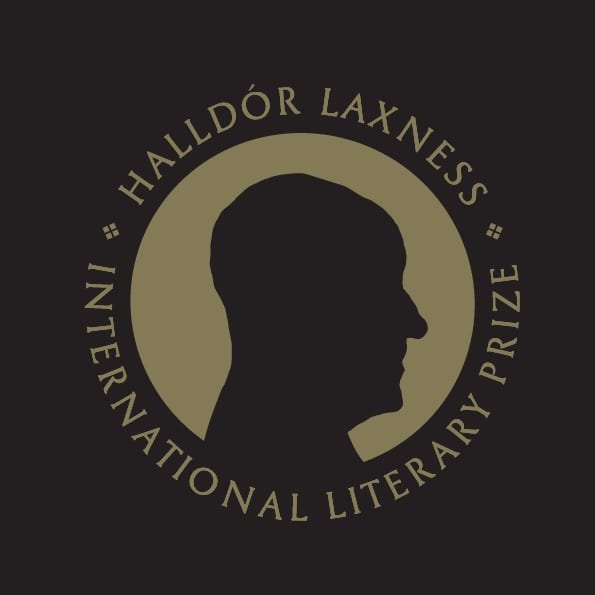
At a symposium on Halldór Laxness hosted by the Reykjavík International Literary Festival, Icelandic Prime Minister Katrín Jakobsdóttir announced the winner of the first Halldor Laxness International Literary Prize.
The prize is 15,000 euros, awarded to internationally recognized authors for contributing to a renewal of the narrative tradition, which were the grounds for awarding Laxness himself the Nobel Prize in 1955. The award is supported by The Prime Minister’s Office; The Ministry for Education, Science and Culture; Promote Iceland; Reykjavík International Literary Festival; Gljúfrasteinn and Forlagið, the Icelandic publisher of Laxness. Henceforth, the prize will be awarded at the Reykjavík International Literary Festival, held every two years. The selection panel this year consisted of Eliza Reid, the First Lady of Iceland, Einar Már Guðmundsson, author, and Stella Soffía Jóhannesdóttir, the director of the Reykjavík International Literary Festival.
The prize’s first winner is the English author Ian McEwan, who was unable to attend the symposium, but will visit Iceland in September to accept the prize. Around the same time, his new novel Machines Like Me will be published in Icelandic by the publishing house Bjartur, translated by Árni Óskarsson.
In a video message shown at the symposium, the author said the award meant much to him and that he was looking forward to coming to Reykjavík in September to receive the prize, the city where the great Laxness was born and wrote.
The selection panel’s verdict
The selection panel of the Halldor Laxness International Literary Prize has decided to award the prize to the English author Ian McEwan. McEwan’s career spans nearly half a century. His first works, the short story collections First Love, Last Rites and In Between the Sheets, followed by the novels The Cement Garden and The Comfort of Strangers, were published between 1975 and 1981, while his newest novel Machines Like Me came out in April 2019, and will soon be available in Icelandic.
His early works attracted much attention, proving to have a strong appeal for enthusiasts for literary innovation. They also stirred controversy. It was not least the provocative subject matter, the seldom-discussed and sensitive themes, which made the author stand out. It has been said of Ian McEwan that he deals not merely with the headlines of the mind, but in equal measure the small print of the soul.
His oeuvre encompasses eighteen published novels and short story collections, as well as movie scripts, children’s stories, plays and a libretto. His stories span an immense range, from chilling depictions of the darkest recesses of the soul to more general social commentary; stories set in today’s era, the Second World War era, the Cold War era, the Thatcherian era, the era of climate change. They are often stories that pose troubling ethical questions on science—its power and limitations.
Modernity permeates his works like factory smoke; not just smoke but an atmosphere, a very special sort of atmosphere, a climate. The style is deliberate, precise and clear, but also characterised by hallucinatory impressions; these are never random, however, but always grounded in the psyche of his characters. The precision of the sentences is an important factor; their cadence and clarity, the atmosphere of the prose, in short. It is apparent that the dilemma of human existence haunts this author, which he consistently responds to in novel and unexpected ways.
The Child in Time, published in 1985, marked the beginning of a new era, characterized by stories of a wider scope, with stronger references to social issues. These include the Cold War stories The Innocent and Black Dogs, as well as Enduring Love. The best-known work of this era is Atonement, which was adapted into a popular film; other works by him have also been adapted for the medium. The novel Amsterdam earned him the Man Booker Prize.
Ian McEwan’s work has met with consistent success, but he has also remained controversial, which should be regarded as a sign of enduring vitality. With this award, we acknowledge a spectacular career and an author with a pressing message.
Works and awards
Short story collections:
First Love, Last Rites
In Between The Sheets
Novels:
The Cement Garden
The Comfort of Strangers
The Child in Time
The Innocent
Black Dogs
The Daydreamer
Enduring Love
Amsterdam
Atonement
Saturday
On Chesil Beach
Solar
Sweet Tooth
The Children Act
Nutshell
Machines Like Me
Awards:
Somerset Maugham Award: First Love, Last Rites (1976)
Whitbread Prize: The Child in Time (1987)
Man Booker Prize: Amsterdam (1998)

